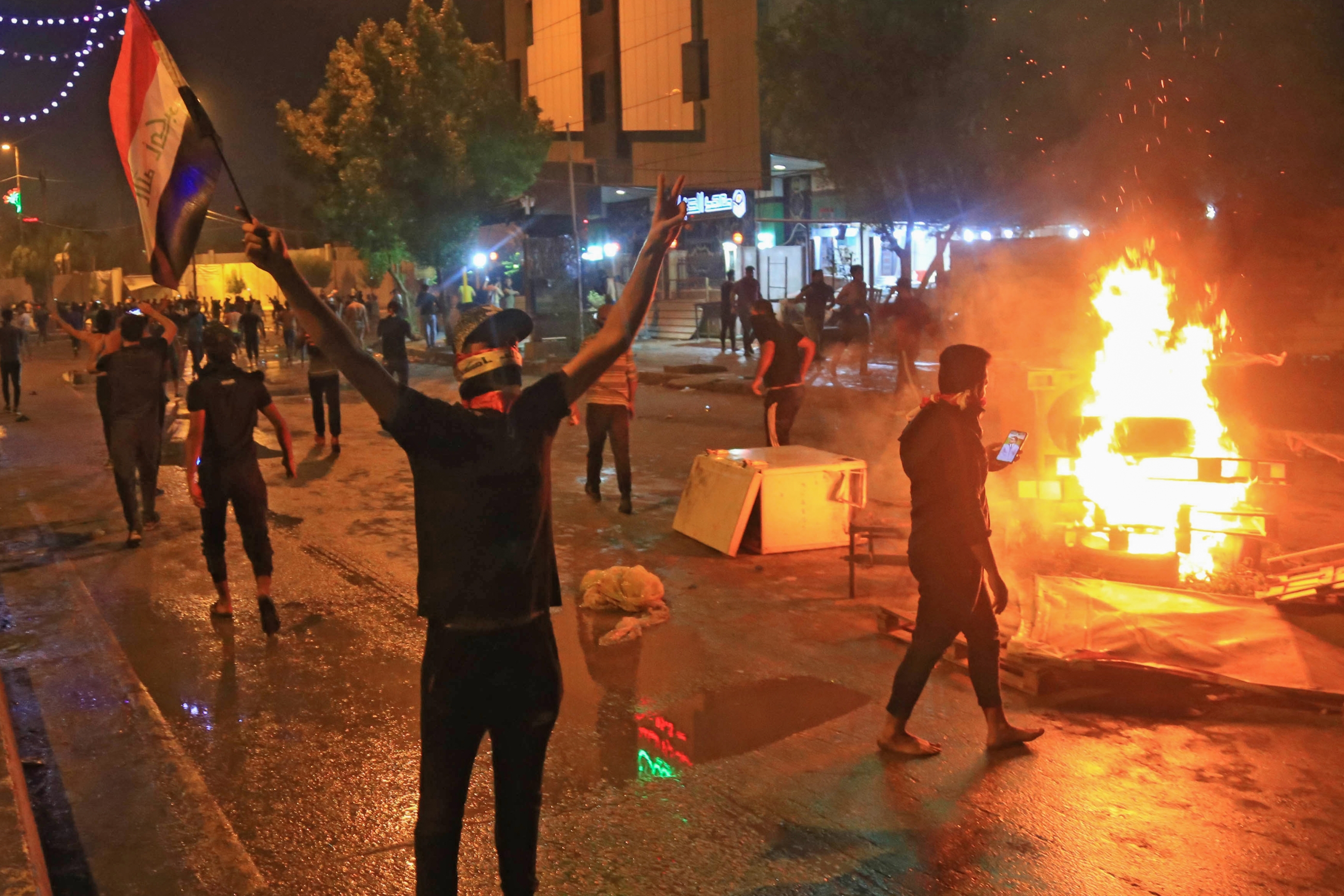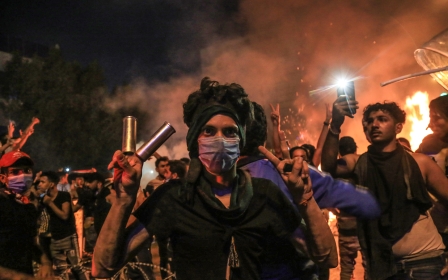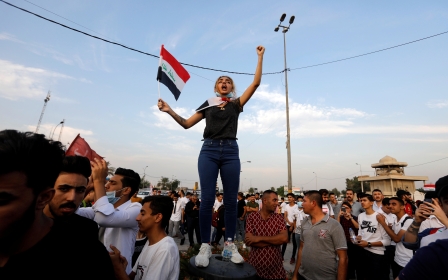'Complete horror': Survivors of Karbala crackdown describe chaos and bloodshed

Iraqis caught up in a deadly crackdown in the holy city of Karbala on Monday have described a scene of “complete horror” in which masked security forces used live ammunition, electric shock batons and tear gas against panicking protesters.
At least 18 people were killed and about 800 others were injured in the assault, according to the semi-official Iraqi Human Rights Commission.
Amnesty International condemned the violence on Tuesday, accusing Iraqi forces of opening fire "in a reckless and unlawful manner”. It put the death toll at 14 and said more than 100 people were injured.
Meanwhile, a doctor at the city’s main al-Hussein hospital also warned that suspected members of the security forces were collecting information about people being brought to the hospital with injuries.
New MEE newsletter: Jerusalem Dispatch
Sign up to get the latest insights and analysis on Israel-Palestine, alongside Turkey Unpacked and other MEE newsletters
Nawras Adnan, a local 38-year-old activist who was taking part in the anti-government protest, said that gunmen had opened fire at people as they tried to run from unidentified security forces using violence to disperse the crowd.
Adnan told MEE that the crackdown began when masked and black-clad paramilitaries arrived at the demonstration site in the centre of Karbala in civilian cars.
“They destroyed the sit-in tents and arrested many protesters. They dispersed the protesters with electric batons and tear gas. Once the protesters started running, they were shot with live ammunition,” he said.
Adnan said he had seen one person immediately killed and hundreds more wounded. Footage posted on social media showed people running from the protest site as gunfire can be heard crackling in the background.
Collecting information
Abbas Hussein, another protester, said the violence began just after 8pm and also accused security forces of targeting unarmed protesters with live bullets.
“After a while, militiamen in black embedded themselves with the protesters and started to document us, collecting information about protesters to target or arrest them at a later time," he said.
Ali al-Baroon, a friend of one of those shot dead in the attack, named as Mustafa Faris Fadhil, recalled the 23-year-old’s excitement about joining the protests.
“Mustafa was my friend since childhood,” the 22-year-old told MEE, as Fadhil was buried on Tuesday afternoon.
“I last saw him hours before he was killed. I asked him, ‘Where are you going Mustafa?’ He answered me: ‘To protest and demand my rights.’”
Baroon said that Fadhil had been shot twice while in the square where the protesters were gathered.
“They shot him with two bullets, one in his head and one in his shoulder. A tuk-tuk driver drove him to al-Hussein hospital, but he died before he arrived.”
Fadhil was married with two children and worked as a cleaner, he added.
“I did not expect him to die in this way. Mustafa was a beloved youth with a very sweet heart. He never hurt anyone in his life. His family and friends are in shock.”
A video posted on Twitter showed Fadhil’s father mourning for his son and blaming security forces for his death.
“He was just carrying the Iraqi flag, no more. Being killed in this criminal way, why did they kill my son Mustafa?” he said.
'Assassination and liquidation'
Security forces were also accused of arresting journalists to disrupt coverage of the protests. Those detained included Haider Hadi, a correspondent for I-News; Tariq al-Tarfi, a correspondent of Al-Rasheed TV; Al-Ittijah TV cameraman Mohammad Abdul-Hussein al-Asadi; and a poet, Mohammad al-Kaab. All have since been released.
A doctor working at al-Hussein hospital who preferred not to be named for security reasons said the hospital had been dealing with injured protesters daily since demonstrations began, with most cases related to tear gas inhalation.
He said the hospital had also treated injured members of the security forces.
“Others were severely injured due to live ammunition or electric batons,” he added.
“There is a lack of medicine in the hospital. Sometimes, the staff collect money themselves to buy medicine for patients.”
The doctor accused security forces of waging a “campaign of assassination and liquidation” against the protesters.
“Even the injured who come to the hospital, all their personal information is taken upon arrival by unidentified security authorities.”
“I asked some of them who they were. One told me he was intelligence, while another one claimed to be from the human rights commission.
“I do not think they were as they claimed. I think they are with the militias who want to collect people’s information to attack them later.”
Widespread outrage
The deaths at the protests have caused widespread outrage, including among politicians. On Wednesday, influential Shia cleric Muqtada al-Sadr called for the resignation of Prime Minister Adel Abdul Mahdi, whose government is facing protests in Baghdad and other cities, over the violence.
"If Prime Minister Adel Abdul Mahdi does not resign, Iraq could turn into another Syria or Yemen," Sadr said on Twitter.
As the leader of the largest faction in the Iraqi parliament, and one of those who originally nominated Abdul Mahdi for the premiership, his denunciation is likely to have an impact.
'[The prime minister's] resignation has become just a matter of time'
- Diyari Salih, analyst
"This means that Abdul Mahdi is now practically out of power," said Diyari Salih, a specialist in political geography at Iraq's Al-Mustansiriya University, speaking to MEE.
"His resignation has become just a matter of time."
While the identity of the security forces responsible for Monday’s attack remains unconfirmed, Nawras Adnan blamed the prime minister.
“Abdul Mahdi sent forces to Karbala to suppress the demonstrators,” said Adnan.
“I want to tell Abdul Mahdi that we will never stop protesting until the whole government resigns and presents us with the snipers who killed the demonstrators.
“Then we will talk,” he added.
This article is available in French on Middle East Eye French edition.
Middle East Eye delivers independent and unrivalled coverage and analysis of the Middle East, North Africa and beyond. To learn more about republishing this content and the associated fees, please fill out this form. More about MEE can be found here.




